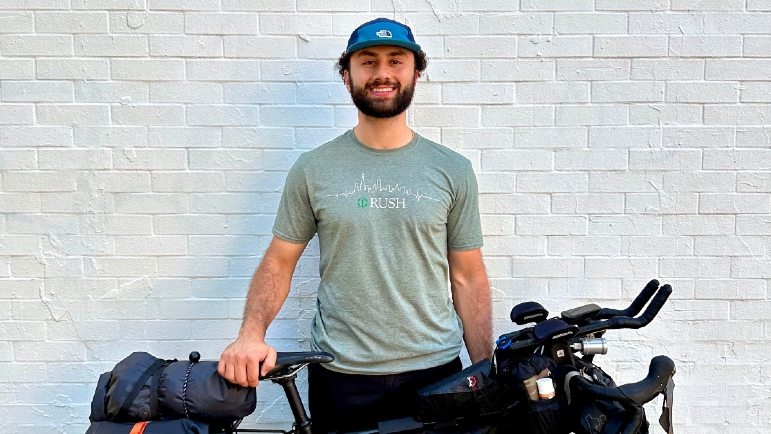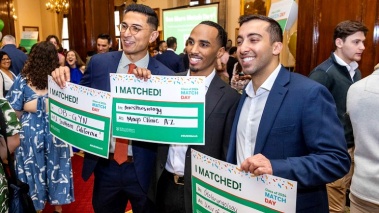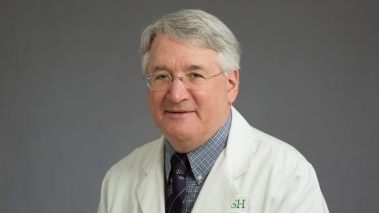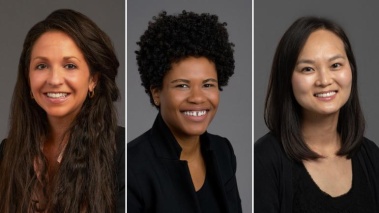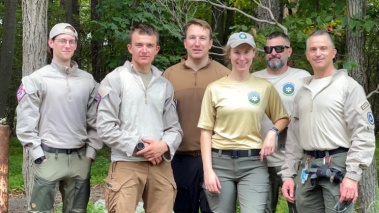A growing body of evidence shows the impact loneliness can have on people’s health. In a recent report US Surgeon General Vivek Murthy, MD, MBA, described how the “epidemic of loneliness and isolation” is taking an enormous toll on so many American’s physical and mental health.
RUSH medical student Andrew Mohama agrees and is embarking on what he is calling the “bike listening tour” from San Francisco to Chicago to collect personal stories from people across different regions and demographics.
The last time Mohama biked across the United State in 2017 he discovered the power his bicycle could have. He realized his bike is not just a machine continually optimized for efficiency and nimbleness; it's a vessel for connection and understanding.
“What I remember most from those 70 days of taking the scenic route 4,500 miles across the U.S. has nothing to do with biking but everything to do with the conversations had and the people I met. While the allure of epic landscapes, daunting climbs, and challenging conditions is undeniable, there's a deeper dimension we can explore—human connection.” Mohama says.
Mohama’s new study, “Loneliness and the Healing Effects of Community and Support: Understanding Human Connection Across America” aims to understand levels and effects of loneliness, social connection and community. The RUSH Medical College-funded research will work to identify what people do to feel more socially connected and what they want to have but currently do not.
“Dr. Murthy’s recent report made the case for loneliness as one of the biggest public health concerns today: a root cause and contributor to many of the epidemics impacting the world—alcohol and drug addiction, cardio-vascular disease, depression, anxiety and even violence.” Mohama says.
Although the body of quantifiable medical evidence of the health impact of loneliness is a necessary step towards how physicians and policymakers can recognize the issue, he also suggests that qualitative research – structured interviews with people during his trip – also has a role to play in building evidence-driven approaches for health care providers.
“This tour combines my love for cycling, storytelling, making space for vulnerable conversations, and narrative-based research all into one adventure,” Mohama explains. “It was born out of an interest to understand this issue more deeply while narrowing in on the restorative power of listening.”
Mohama notes that while important, research that includes surveys where the thoughts and opinions of large groups are recorded don’t capture the nuance and deeper understanding of what they deeply feel. Studies like Mohama’s bike tour where smaller, more intimate conversations are taking place may be a way to fill that gap.
“Through storytelling, we bridge the gap between strangers and uncover the common threads that weave us together as a global community. We learn about the dreams, struggles, and triumphs of those we meet, and in doing so, we broaden our own understanding of the world. It's in these connections that we find solace, inspiration, and a deeper sense of purpose.” Mohama reflects. “Storytelling can be a compass, guiding us towards shared experiences. If given the safe space to share and truly listen, storytelling becomes a tool that allows people to relive pivotal moments, process them, and maybe even seek closure or revelation. The stories we hear from the individuals we encounter become intertwined with our own narratives, leaving an indelible mark on our hearts and minds.”
And while he hopes his research project can contribute to a collective body of evidence, he expects his bike tour will immediately help improve the skill many patients say too many physicians lack.
“While this is approved, supervised research, it is also a listening tour. I cannot presume how people will reply to my questions, but I’m confident that investing myself in how I listen and understand their thoughts and concerns will make me a better physician and person overall.”
Mohama will start his trip in San Francisco around July 15 and is hoping to end his trip back in Chicago about one month later. He plans to bike through California, Nevada, Utah, Colorado, Nebraska, Iowa and Illinois. As Mohama travels his way through the western half of the United States, RUSH University’s social channels will be providing updates on his journey. You can follow along through RUSH University’s Instagram and Andrew’s Instagram.

